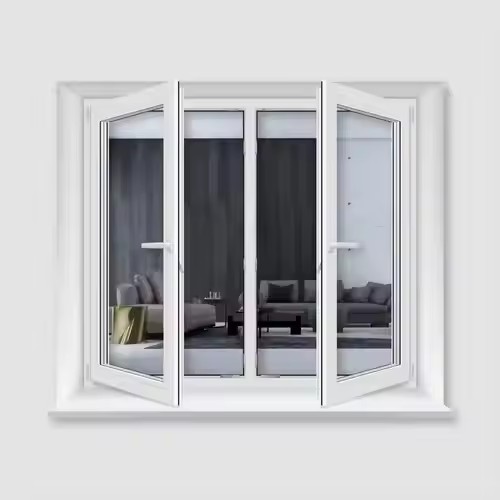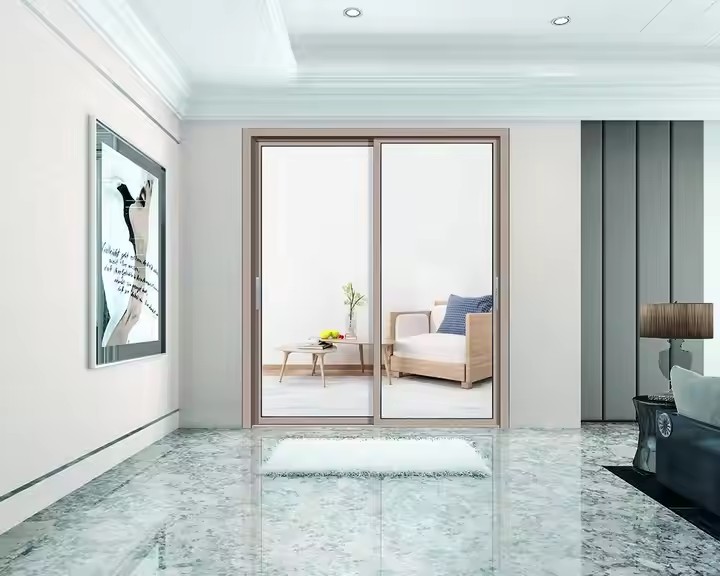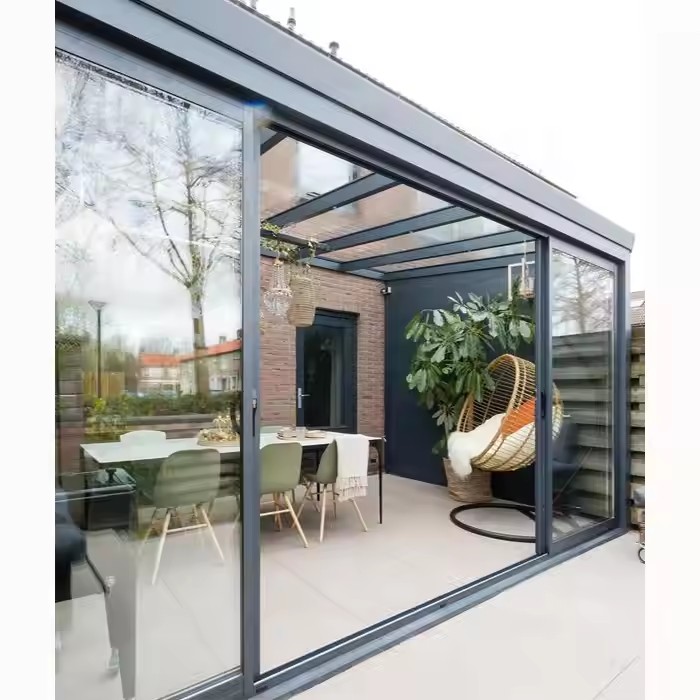- Ultimate Space Optimization: Breaking the “Occupancy Limitation” of Traditional Doors and Windows
Low space utilization has always been a pain point of traditional doors and windows — swing doors require 1–2 m² of clearance to open, while sliding doors are restricted by their track system, allowing only one side to open (typically 50% of the doorway).
Chinese folding doors, through their multi-panel folding structure, fundamentally solve this problem and have become a “space saver” for small apartments and compact areas.
On one hand, when opened, the panels can fold to one or both sides, and the stacked width is only the thickness of a single panel (usually 5–8 cm), taking up almost no extra space.
For example:
Balcony – When installed on a balcony, the folding door can fully connect the living room and outdoor area. The corners that would otherwise be wasted by a swing door can be transformed into a green plant zone or a leisure nook.
Kitchen – Folding doors between the kitchen and dining area eliminate physical barriers, allowing cooking, preparation, and family interaction to happen simultaneously, avoiding the awkwardness of a swing door blocking the way.

In short, folding doors free up more usable area, giving homeowners more room for storage and activity.
On the other hand, the full-opening feature of folding doors maximizes passage width and natural lighting.
While ordinary sliding doors only open about half the doorway, folding doors can achieve over 90% opening.
For commercial spaces (like boutiques or cafés), fully opening folding doors extend the store’s visual boundary, displaying merchandise to passersby and increasing foot traffic.
For villas or luxury apartments, fully opened terrace folding doors seamlessly merge indoor and outdoor spaces, creating an immersive scenic experience.
- Adaptable to Diverse Scenarios: From Homes to Commercial Spaces
A major strength of Chinese folding doors lies in their versatile adaptability. Whether in residential settings (balconies, kitchens, studies), commercial storefronts, meeting rooms, exhibition halls, or even public facilities, there is always a suitable folding door solution — made possible by flexible customization and diverse material options.
In residential applications:
Balcony folding doors often use thermal-break aluminum + double-glazed glass, which provides noise reduction of 30–40 dB (reducing street noise from 60 dB to 20–30 dB, comparable to a library) and over 90% UV protection (with optional Low-E coating), balancing transparency with insulation.
Kitchen folding doors often feature ultra-slim frames + tempered glass. Frames as narrow as 1.6 cm minimize visual obstruction, making the kitchen and dining space feel more open, while tempered glass is easy to clean — a simple wipe removes grease.
Study rooms or walk-in closets can use lightweight aluminum alloy + fabric panels, providing privacy and flexible zoning without needing extra curtains.
In commercial and public environments, folding doors excel in large-span stability.
For example:
Shopping mall atriums can use heavy-duty folding doors (single panels up to 1.2 m wide and 4 m high). Combined panels can span over 10 meters, providing adaptable traffic flow and spatial division.
Exhibition centers can reconfigure booths and partitions quickly — when not needed, the folding doors open fully, creating expansive, flexible layouts for different event formats.
- Enhanced User Experience: Balancing Convenience and Comfort
Chinese folding doors prioritize user experience, with design innovations across operation, sealing performance, and safety details to maximize comfort and convenience.
In terms of operation, there are both manual and electric options:
Manual folding doors use silent rollers and anti-jump tracks, keeping panel weight within 15 kg so even elderly users can slide them easily. Noise remains under 40 dB, eliminating the jamming or creaking issues of traditional sliding doors.
Electric folding doors integrate remote and sensor control, allowing operation via mobile app, wall switch, or motion detection — ideal for large or heavy doors. For instance, a villa garage can use an electric folding door that opens via remote control without the driver leaving the car.

In terms of sealing performance, folding doors employ multi-layer rubber gaskets + recessed tracks to prevent air and water leakage.
EPDM gaskets (durable and elastic, lasting over 10 years) are installed between frames and panels, while recessed drainage channels discharge rainwater to prevent backflow.
Thermal-break aluminum structures also block heat transfer, keeping interiors 3–5°C warmer in winter and cooler in summer — improving both comfort and energy efficiency.
In detail design, folding doors embody user-centric thinking:
Rounded corners prevent injuries to children.
Flush “hidden tracks” align with the floor surface for barrier-free access, safer for seniors and easier for cleaning robots.
Some models include anti-pinch sensors: if an obstacle (like a hand or pet) is detected during closing, the door automatically reverses direction, ensuring safety.

